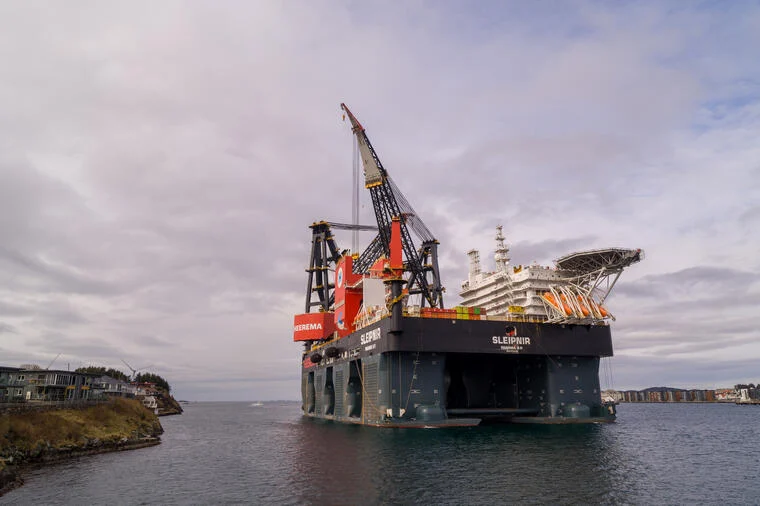A cross-boundary project involving science and industry experts has landed EUR 3.4 million from an EU climate action fund to accelerate the uptake of ship-based carbon capture (SBCC). The EverLoNG project will conduct technology trials on board two LNG-fuelled ships, including Heerema’s Sleipnir, along with supporting studies.
The EverLoNG project led by TNO will demonstrate SBCC on board two LNG-fuelled ships, owned and operated by project partners TotalEnergies and Heerema Marine Contractors, with results aimed at moving the technology closer to market readiness.
As well as the SBCC trials, the sixteen project partners from five countries – Germany, the Netherlands, Norway, the UK, and the USA – will conduct studies to support the development of full-chain carbon capture, utilisation and storage (CCUS) networks, connecting SBCC with CO2 transport links, geological CO2 storage and markets for CO2 use. These studies will identify and help solve any technical barriers to the implementation of SBCC as well as lower the costs associated with the technology.
Also read: Value Maritime & Carbon Collectors explore carbon capture on MGO-fuelled tugs
To market in 2025
The project consortium includes ship classification societies Lloyd’s Register, Bureau Veritas and DNV, who will evaluate how SBCC fits within existing regulatory frameworks for shipping.
Combined activities by EverLoNG partners will support the ambitious target of advancing SBCC as a cost-competitive decarbonisation option on the market by 2025, with a marginal abatement cost – the cost of reducing environmental impact – of between EUR 75 and EUR 100 per tonne of CO2 equivalent and a CO2 capture rate of up to ninety per cent.
‘Funding from the ACT3 program will enable us to conduct studies aimed at making commercial ship-based carbon capture a reality,’ says EverLoNG project coordinator, Marco Linders of TNO. ‘Our demonstration campaigns will optimise SBCC technology and we will also consider how best to integrate it into existing ship and port infrastructure. We’ll also carry out detailed life cycle assessments and techno-economic analysis, which will be essential information for maritime sector companies. International collaboration is a big part of EverLoNG and our consortium is fully committed to supporting the shipping industry’s decarbonisation goals.’
Also read: ‘Capex of 29 million euros for carbon capture and storage on ships’
Sleipnir and LNG carrier trials
Ship-based carbon capture (SBCC) will be demonstrated on board an LNG Carrier of TotalEnergies and Heerema‘s Sleipnir using EverLoNG’s prototype. Extensive testing is to address key knowledge gaps and prepare SBCC technology for commercial use.
Ten tonnes of CO2 will be captured on board the LNG carrier, during a 3000-hour test campaign, providing data on environmental emissions and the impact of motion on capture rates, capture solvent behaviour and degradation. A second campaign of around 500 hours of CO2 capture operations on board Heerema’s Sleipnir ship will allow the researchers to compare the system performance on both ships to provide further insights.
Heerema’s Sustainability Project Manager, Cees Dijkhuizen: ‘At Heerema, we believe that a responsible company is a sustainable company. This belief is why we became carbon neutral in 2020 and have committed to reducing our footprint by up to eighty per cent by the end of 2026. Taking part in the EverLoNG Project and testing the use of a carbon capture and storage system onboard our vessel Sleipnir is an important step towards reaching our goals.’
Philip Llewellyn, Carbon Capture, Utilisation and Storage Program Manager, TotalEnergies, adds: ‘Ship-based carbon capture is a promising short-term solution as it could be installed on the current fleet of ships.’

Also read: Dutch consortium investigates onboard carbon capture








